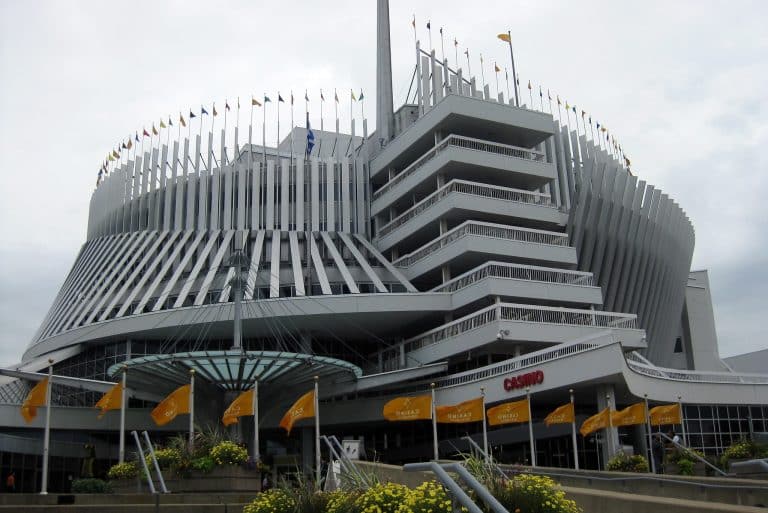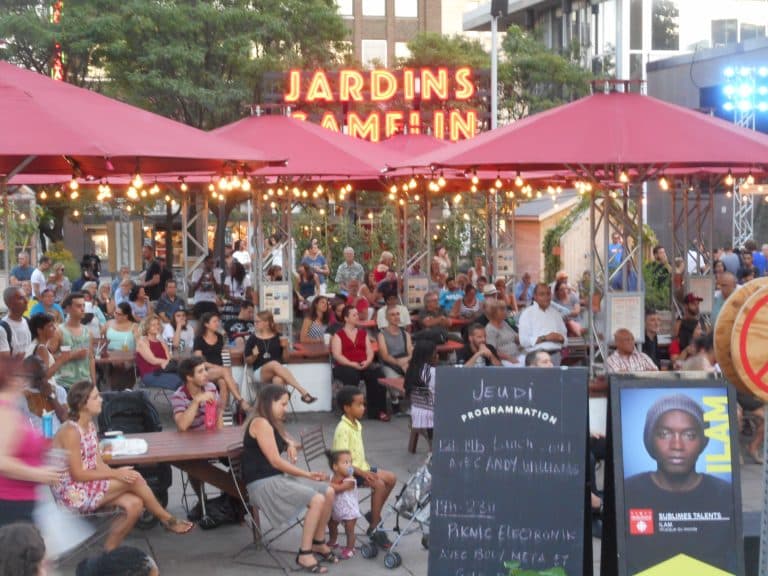Do I Need To Speak French in Montreal as a Tourist? A Local’s Perspective.
Whenever someone who isn’t from Montreal finds out I’m a native Montrealer, they’ll ask me: Do I need to speak French in Montreal? And I get it. Most people outside Canada know about Montreal for two things: the French language and our absolute stronghold over poutine.
The use of French in Montreal is an ever-evolving conversation, but the answer depends on why you’re coming to Montreal: to visit, study, or live. In this post, I’ll tell you everything you need to know about navigating Montreal as a multilingual city in a province where French is the official language.
If you’re a tourist, the short answer is no, you don’t need to speak French in Montreal. But you need to know where to stay in the city as some areas are more English-speaker-friendly than others.

Notre Dame Cathedral in Montreal. You don’t need to speak French to visit as they have English tours and programs daily. Photo: Photo by Kris Schulze.
Why Do People in Montreal Speak French?
English-French Relations Throughout History
It’s time for a little Canadian history lesson. Canada was mostly colonized by Britain, but there are select parts—Québec, some of New Brunswick, a small region in Manitoba, and parts of Ontario—that the French colonized. England and France are historical rivals, so for many French Canadians, speaking French became a matter of pride and resistance.
Québec has been adamant about its place as a distinct society within Canada. Although Canada is a bilingual nation, the operating language of most provinces is English. You’ll be hard-pressed to find a Canadian outside a fluently bilingual French-speaking area.
I’ve lived in Winnipeg and Toronto. Finding a fluent French speaker is uncommon. Most people know enough to satisfy customer service needs, but that’s about it. I’ve worked and managed Canadian teams and was the only person actually fluent.
Importance of the French Language in Québec
Language is, therefore, one of the most important ways that Québec retains its distinctive identity. Unlike the other provinces and territories of Canada, the operating language of the province is French.
Our street, highway, and parking signs are in French. All shops must have a French or translated name, and people are supposed to greet you in French throughout the province when you walk into a store and use French as the language of conversation. Supposed to is the key here.
Most shop workers and heritage and museum workers will be bilingual or at a bare minimum have enough broken English to help you. Most Québécois, regardless of where we fall on the language spectrum, speak a broken hybrid of English and French anyway, lovingly called “Franglais.”

The Montreal Biosphere, an iconic Montreal landmark. Photo: Daneil ren ren.
Do You Need To Speak French in Montreal?
Visiting Montreal as a Tourist
Absolutely not, as long as you stick to touristy areas and activities. You might have a more challenging time if you’re staying in the suburbs or outside English-speaking neighborhoods.
For instance, Outremont, the Latin Quarter of Montreal, or anything east of the Berri-UQAM metro station will be more French-speaking. That’s not to say that you won’t find any English speakers, but you’re far more likely to encounter unilingual Francophones in these parts of town or more resistance to your presence.
In general, even if a shop or heritage worker doesn’t speak English, you’ll be surrounded by English-speaking people who are more than happy to help you. Ridesharing and taxi services in Montreal might be your biggest hangup as many of the drivers are unilingual Francophones. Th
Studying in Montreal
It’s going to be helpful to know some French. Your university will have language classes available for free to help you practice your French, and I highly recommend leveraging these resources. If you’re going to be in Montreal for a few years, you don’t want to deprive yourself of the opportunity to make friends with the many amazing French speakers who live here!
If you’re studying and working, you will need French as you must speak French at work. Start practicing with Duolingo as soon as you get accepted, and you’ll have pretty solid proficiency by the time you get here!
Living in Montreal
If you’re moving to Montreal from another country to live and work, you will need French. You’ll live your day-to-day life in French, and the government mandates that workplaces operate in French. Your only shot at working in English is to have an entirely English-language company or to work remotely for a company based elsewhere in Canada.
Otherwise, most migrants will be required to learn and work in French.

You don’t need to speak French in Montreal on double-decker bus tours. There are 8 languages that the tours are conducted in. Photo: Hardeep Singh.
Montreal Neighborhoods Where You Don’t Need To Speak French
Westmount
Westmount is an excellent choice if you’re feeling fancy and want to stay in a higher-end part of the city with lots of historic residential architecture. You’ll be West of most tourist attractions, so keep in mind that it will be more of a trek, but you’re about 20 minutes from any cultural site on your list.
The affluent English community of Montreal settled in Westmount, so you’ll find a lot of English architectural styles. The neighborhood is also home to Westmount Square. Westmount square is a shopping and office complex designed by famous architect Mies Van Der Rohe. It’s worth taking a pass-through if you’re staying in Westmount, and they have a lot of great little restaurants and shops.
Ville Marie
Montreal has two English-language universities and several English-language CEGEPs. If you’re between Concordia and McGill in downtown Montreal, you’re generally in English-language territory. This neighborhood is known as Ville-Marie.
The hospitals, commerce, etc. in between the universities are driven mainly by high populations of students who spend their days speaking English. The fringes of this area, which is one of the largest neighborhoods in the city, may require more French as a tourist visiting Montreal, but in general, if you’re in this part of the city, you’ll have no problem communicating with people in English.
If you’re trying to figure out where to stay in Montreal as an English speaker, I would stay near the green line. Stay between stations Lionel-Groulx and Berri-UQAM, most of which are located in Ville-Marie. The Metro is the easiest and most cost-effective way to get around Montreal. The green line will be the most anglophone-friendly between those stations.
Mile End
Mile End is one of the primary student hubs in the city. Closer to McGill University, which is consistently named one of the top party schools in North America, you’ll find that it’s a vibrant neighborhood brimming with youth.
You must stay in Mile End if you’re in your 20s and want to be at bars until 3 am every night. I spent the first half of grad school in Mile End, but it was too noisy for me, so I had to move. So, if you’re not coming to Montreal to party, I would avoid hotels in this neighborhood.
Mile End has some of the most fantastic food in the city, though, so don’t avoid it altogether. I’d just steer clear after 9 pm if you want a quieter experience.
Notre Dame de Grace
NDG, as locals call it, is out of the way of most of the tourist attractions in the city and probably closer to 30-45 minutes to most museums in the city. But I highly recommend this part of town if you want to be out of the hustle and bustle. I lived in NDG for about a year while I was in my apartment hopping phase in my 20s and it’s a very safe and quiet neighborhood that’s family-friendly.
This neighbourhood has a sizeable English-speaking contingency and tons of Airbnbs and furnished rentals available.

A man exiting the Montreal Metro. Photo: Elena Saharova
Common French Phrases To Know When Traveling to Montreal
Even if you don’t speak French, a few words will be helpful, especially when dealing with Francophones. You don’t need to speak French to visit Montreal, but politeness and making an effort to talk in French will go a long way!
Some French phrases you should know or that you might hear a lot include:
- “Bonjour” (pronounced: bow-n-jew-r) means hello! Say it to hospitality workers and those random people you pass in the elevator at your hotel. Basic politeness goes a long way.
- “Ou sont les toilettes?” (pronounced: Ooh so-n lay twa-lets) means “where are the bathrooms?” Probably the most critical phrase in any language.
- “En quel direction est [attraction here]” (pronounced: On kel dee-rection A [attraction here]) means “What direction is this attraction?” Particularly useful if you’re taking transit or walking somewhere. Most people in the city won’t know the address but can point you at least in the direction of something.
- “S’il vous plait” (prounounced: Sill voo play) means “please.” You may see this written on signs as “svp,”
- “Une table pour [#], s’il vous plait” (pronounced Ooh-n tah-ble poo-r #, sill voo play) means “a table for # please.” It’s a good idea to learn the number for the number of people you’ll be travelling with.
- “Billet” (pronounced bee-yay) means a ticket. You’ll need this one for the Metro and for any and all attractions.
- “La ligne est en panne” (pronounced lah lee-n-yuh A on pan) means “the line is down.” Get used to it if you take the Metro—you’ll hear it a lot. You won’t say this one, but you definitely need to recognize it.
- If la ligne bleue est en panne, it means the blue line is down.
- If la ligne verte est en panne, this means that the green line is down.
- La ligne jaune est en panne means that the yellow line is down.
- La ligne orange est en panne means I’m experiencing war flashbacks to my university days the orange line is down. The STM fixes pans within 10 minutes usually.
- “Tabarnac” (pronounced Tah-bah-r-knack) is one you probably won’t say but are likely to hear a lot. It’s a Québécois curse word. You won’t hear this anywhere but Québec.
- “Calisse” (pronounced call-iss) is another Québécois swear word you’ll hear a lot. You won’t hear this anywhere but Québec.
Do I Need To Speak French in Montreal as a Tourist?
To sum up, you won’t need to speak French in Montreal as a tourist. If you’re here for a week or two and sticking to touristy things, you’ll be fine. Montreal is an international city that’s very welcoming to people of all countries, but as with anywhere else, we always appreciate it when you make an effort.
Remember, most phones now can access a translation app easily to help you communicate back and forth!



